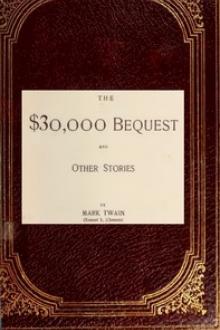The $30,000 Bequest, Mark Twain [best book club books for discussion TXT] 📗

- Author: Mark Twain
- Performer: 1406911003
Book online «The $30,000 Bequest, Mark Twain [best book club books for discussion TXT] 📗». Author Mark Twain
where he was, with such an object before him, without being allowed
an explanation in that trying hour, would be to the great injury
of his mental as well as of his physical powers; and, in the name
of high heaven, what must he do? Finally, he resolved to contain
himself as well as he conveniently could, until the scene was over,
and then he would plant himself at the door, to arrest Ambulinia from
the hands of the insolent Elfonzo, and thus make for himself a more
prosperous field of immortality than ever was decreed by Omnipotence,
or ever pencil drew or artist imagined. Accordingly he made
himself sentinel, immediately after the performance of the evening—
retained his position apparently in defiance of all the world; he waited,
he gazed at every lady, his whole frame trembled; here he stood,
until everything like human shape had disappeared from the institution,
and he had done nothing; he had failed to accomplish that which he
so eagerly sought for. Poor, unfortunate creature! he had not
the eyes of an Argus, or he might have seen his Juno and Elfonzo,
assisted by his friend Sigma, make their escape from the window,
and, with the rapidity of a race-horse, hurry through the blast of
the storm to the residence of her father, without being recognized.
He did not tarry long, but assured Ambulinia the endless chain
of their existence was more closely connected than ever, since he
had seen the virtuous, innocent, imploring, and the constant
Amelia murdered by the jealous-hearted Farcillo, the accursed of
the land.
The following is the tragical scene, which is only introduced
to show the subject-matter that enabled Elfonzo to come to such
a determinate resolution that nothing of the kind should ever
dispossess him of his true character, should he be so fortunate
as to succeed in his present undertaking.
Amelia was the wife of Farcillo, and a virtuous woman; Gracia,
a young lady, was her particular friend and confidant. Farcillo grew
jealous of Amelia, murders her, finds out that he was deceived,
AND STABS HIMSELF. Amelia appears alone, talking to herself.
A. Hail, ye solitary ruins of antiquity, ye sacred tombs and
silent walks! it is your aid I invoke; it is to you, my soul,
wrapt in deep mediating, pours forth its prayer. Here I wander upon
the stage of mortality, since the world hath turned against me.
Those whom I believed to be my friends, alas! are now my enemies,
planting thorns in all my paths, poisoning all my pleasures,
and turning the past to pain. What a lingering catalogue of sighs
and tears lies just before me, crowding my aching bosom with
the fleeting dream of humanity, which must shortly terminate.
And to what purpose will all this bustle of life, these agitations
and emotions of the heart have conduced, if it leave behind it
nothing of utility, if it leave no traces of improvement? Can it
be that I am deceived in my conclusions? No, I see that I have
nothing to hope for, but everything for fear, which tends to drive
me from the walks of time.
Oh! in this dead night, if loud winds arise,
To lash the surge and bluster in the skies,
May the west its furious rage display,
Toss me with storms in the watery way.
(Enter Gracia.)
G. Oh, Amelia, is it you, the object of grief, the daughter of opulence,
of wisdom and philosophy, that thus complaineth? It cannot be you
are the child of misfortune, speaking of the monuments of former ages,
which were allotted not for the reflection of the distressed,
but for the fearless and bold.
A. Not the child of poverty, Gracia, or the heir of glory and peace,
but of fate. Remember, I have wealth more than wit can number; I have
had power more than kings could emcompass; yet the world seems a desert;
all nature appears an afflictive spectacle of warring passions.
This blind fatality, that capriciously sports with the rules
and lives of mortals, tells me that the mountains will never again
send forth the water of their springs to my thirst. Oh, that I
might be freed and set at liberty from wretchedness! But I fear,
I fear this will never be.
G. Why, Amelia, this untimely grief? What has caused the sorrows
that bespeak better and happier days, to those lavish out such
heaps of misery? You are aware that your instructive lessons
embellish the mind with holy truths, by wedding its attention
to none but great and noble affections.
A. This, of course, is some consolation. I will ever love my own
species with feelings of a fond recollection, and while I am
studying to advance the universal philanthropy, and the spotless
name of my own sex, I will try to build my own upon the pleasing
belief that I have accelerated the advancement of one who whispers
of departed confidence.
And I, like some poor peasant fated to reside
Remote from friends, in a forest wide.
Oh, see what woman’s woes and human wants require,
Since that great day hath spread the seed of sinful fire.
G. Look up, thou poor disconsolate; you speak of quitting
earthly enjoyments. Unfold thy bosom to a friend, who would be
willing to sacrifice every enjoyment for the restoration of the
dignity and gentleness of mind which used to grace your walks,
and which is so natural to yourself; not only that, but your
paths were strewed with flowers of every hue and of every order.
With verdant green the mountains glow,
For thee, for thee, the lilies grow;
Far stretched beneath the tented hills,
A fairer flower the valley fills.
A. Oh, would to Heaven I could give you a short narrative of my
former prospects for happiness, since you have acknowledged to be
an unchangeable confidant—the richest of all other blessings.
Oh, ye names forever glorious, ye celebrated scenes, ye renowned
spot of my hymeneal moments; how replete is your chart with
sublime reflections! How many profound vows, decorated with
immaculate deeds, are written upon the surface of that precious
spot of earth where I yielded up my life of celibacy, bade youth
with all its beauties a final adieu, took a last farewell of the
laurels that had accompanied me up the hill of my juvenile career.
It was then I began to descend toward the valley of disappointment
and sorrow; it was then I cast my little bark upon a mysterious ocean
of wedlock, with him who then smiled and caressed me, but, alas! now
frowns with bitterness, and has grown jealous and cold toward me,
because the ring he gave me is misplaced or lost. Oh, bear me,
ye flowers of memory, softly through the eventful history of
past times; and ye places that have witnessed the progression of man
in the circle of so many societies, and, of, aid my recollection,
while I endeavor to trace the vicissitudes of a life devoted
in endeavoring to comfort him that I claim as the object of my wishes.
Ah! ye mysterious men, of all the world, how few
Act just to Heaven and to your promise true!
But He who guides the stars with a watchful eye,
The deeds of men lay open without disguise;
Oh, this alone will avenge the wrongs I bear,
For all the oppressed are His peculiar care.
(F. makes a slight noise.)
A. Who is there—Farcillo?
G. Then I must gone. Heaven protect you. Oh, Amelia, farewell,
be of good cheer.
May you stand like Olympus’ towers,
Against earth and all jealous powers!
May you, with loud shouts ascend on high
Swift as an eagle in the upper sky.
A. Why so cold and distant tonight, Farcillo? Come, let us each
other greet, and forget all the past, and give security for the future.
F. Security! talk to me about giving security for the future—
what an insulting requisition! Have you said your prayers tonight,
Madam Amelia?
A. Farcillo, we sometimes forget our duty, particularly when we
expect to be caressed by others.
F. If you bethink yourself of any crime, or of any fault, that is
yet concealed from the courts of Heaven and the thrones of grace,
I bid you ask and solicit forgiveness for it now.
A. Oh, be kind, Farcillo, don’t treat me so. What do you mean
by all this?
F. Be kind, you say; you, madam, have forgot that kindness you owe
to me, and bestowed it upon another; you shall suffer for your
conduct when you make your peace with your God. I would not slay thy
unprotected spirit. I call to Heaven to be my guard and my watch—
I would not kill thy soul, in which all once seemed just, right,
and perfect; but I must be brief, woman.
A. What, talk you of killing? Oh, Farcillo, Farcillo, what is
the matter?
F. Aye, I do, without doubt; mark what I say, Amelia.
A. Then, O God, O Heaven, and Angels, be propitious, and have mercy
upon me.
F. Amen to that, madam, with all my heart, and with all my soul.
A. Farcillo, listen to me one moment; I hope you will not kill me.
F. Kill you, aye, that I will; attest it, ye fair host of light,
record it, ye dark imps of hell!
A. Oh, I fear you—you are fatal when darkness covers your brow;
yet I know not why I should fear, since I never wronged you in all
my life. I stand, sir, guiltless before you.
F. You pretend to say you are guiltless! Think of thy sins,
Amelia; think, oh, think, hidden woman.
A. Wherein have I not been true to you? That death is unkind,
cruel, and unnatural, that kills for living.
F. Peace, and be still while I unfold to thee.
A. I will, Farcillo, and while I am thus silent, tell me the cause
of such cruel coldness in an hour like this.
F. That RING, oh, that ring I so loved, and gave thee as the ring
of my heart; the allegiance you took to be faithful, when it
was presented; the kisses and smiles with which you honored it.
You became tired of the donor, despised it as a plague, and finally
gave it to Malos, the hidden, the vile traitor.
A. No, upon my word and honor, I never did; I appeal to the Most
High to bear me out in this matter. Send for Malos, and ask him.
F. Send for Malos, aye! Malos you wish to see; I thought so.
I knew you could not keep his name concealed. Amelia, sweet Amelia,
take heed, take heed of perjury; you are on the stage of death,
to suffer for YOUR SINS.
A. What, not to die I hope, my Farcillo, my ever beloved.
F. Yes, madam, to die a traitor’s death. Shortly your spirit shall
take its exit; therefore confess freely thy sins, for to deny tends
only to make me groan under the bitter cup thou hast made for me.
Thou art to die with the name of traitor on thy brow!
A. Then, O Lord, have mercy upon me; give me courage, give me grace
and fortitude to stand this hour of trial.
F. Amen, I say, with all my heart.
A. And, oh, Farcillo, will you have mercy, too? I never
intentionally offended you in all my life, never LOVED Malos,
never gave him cause to think so, as the high court of Justice
will acquit





Comments (0)